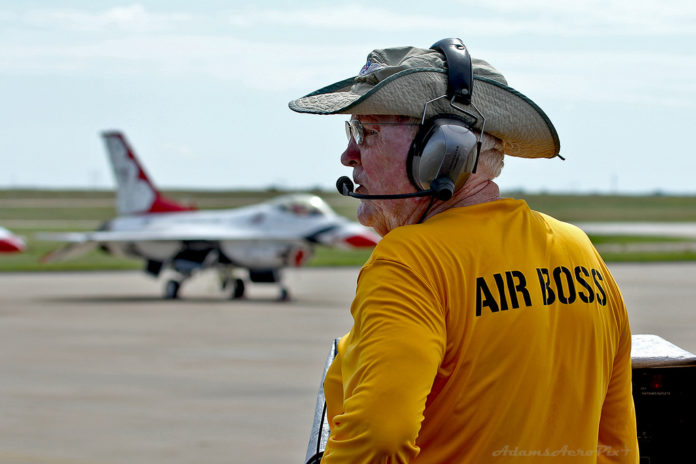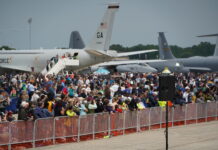During the second quarter of 2010, ICAS members received an invitation to participate in a survey on air boss-related issues. This survey, the latest part of a larger initiative to define, standardize and professionalize the air boss function, was conducted to gather data and opinions about the air boss’s role in the air show environment, the general safety views of air show professionals and the training of air bosses by ICAS. Not surprisingly, there was a very broad consensus on many issues. Specifically:
- ICAS members nearly unanimously support the idea that the air boss is a critical element of the safety program for any air show.
- Survey respondents concur that ICAS should continue its work to train current and prospective air bosses.
- Air show professionals agree that North American air bosses should possess some level of proficiency and/or training prior to performing the role of an air boss at an air show.
- ICAS performers do not think that air bosses talk too often on the radio during air shows.
- ICAS members do not think that the air boss should be responsible for identifying performers to perform in air shows in which they are involved.
This broad summation of ideas parallels the consensus based on my daily interaction with the air show community. To most accurately describe these viewpoints, let’s look at some of the individual questions and the aggregate responses to those questions.
“The air boss is a critical element of the safety program for any air show.”
The air boss has the greatest and most involved real-time interaction with the safety-related moving parts of an air show performance. Whether it is communicating with performers, planning the air show sequence, coordinating arriving and departing traffic, organizing the onsite crash fire and rescue resources or de-conflicting aircraft movement on the hot ramp, the air boss will have a finger on the pulse of the entire air show performance. And, in that capacity, ICAS members believe that he is in a unique position to improve overall air show safety. There was no other statement that had as much consensus as this one; 93.8 percent of survey respondents agreed or strongly agreed that the air boss is a critical part of air show safety.
“ICAS should continue its work to train active and prospective air bosses.”
ICAS offers many training and education options for newcomers to the air boss profession. Air show veterans also have many opportunities to learn, acquire and improve relevant skills necessary to safely execute the duties of an air boss. ICAS has been offering its classroom-style Air Boss 201 training seminar for more than fifteen years. Conducted for the first time in the fall of 2009, the ICAS Air Boss Academy is an opportunity for air bosses and prospective air bosses to learn from some of the most experienced professionals in the business.
“North American air bosses should possess some level of proficiency and/or training prior to performing the role of an air boss at an air show.”
At a recent training workshop for FAA flight standards inspectors organized and conducted by ICAS, one of the inspectors asked this question: “Is it true that there are air bosses with little or no training that effectively act as air traffic controllers during the air show?” The answer is, “Yes,” and there is broad consensus within the industry that this situation should not be allowed to persist. Only 5 percent of the 250 survey respondents disagreed or strongly disagreed that air bosses should have training before acting as air bosses.
“The status quo as it relates to air bosses in North America (no training, experience or demonstration of proficiency required) represents a clear safety hazard in our industry. “
Just 16.6 percent of survey respondents disagreed with this statement and nearly 60 percent agreed or strongly agreed. Together with anecdotal comments from the field, the response to this and other questions in the survey suggest that, as the air boss has become a more important and integral part of the air show operations and safety structure, the air show community is beginning to expect more of them. Simply having the desire or interest to serve as air boss is no longer enough. Too many people and too many aspects of safe air show operations rely on the assumption that the air boss knows what he or she is doing.
“Air bosses do not talk too often during air shows.”
There were some concerns expressed during the 2009 air show season that talkative air bosses were distracting the performing pilots and causing a safety hazard. As part of our Safety Management System (SMS) approach to addressing potential safety hazards, ICAS investigated this issue and determined that talkative air bosses were not, in fact, a safety hazard. The responses to this question support that finding. Only 16.6 percent of survey respondents agreed with the statement that air bosses talk too much on the radio and should exercise better radio discipline.
“The air boss should not be responsible for identifying performers to perform in air shows in which they are involved.”
There has been a steady concern that air bosses at certain shows have represented themselves as being essential to the selection of performers at those shows. While this concern is ongoing, it is a fact of air show life that some air bosses perform this role at multiple air shows. The ICAS membership used their survey responses as an opportunity to voice their objection to this practice. Only 13.8 percent of those surveyed agreed with the statement that, “The air boss should be completely or largely responsible for identifying performers to perform in the air show for any event with which he/she is involved.” Interestingly, the opinions on this did not differ based on perspective; event organizers and air bosses were just as likely to disagree with this statement as performers.
One air boss used the narrative comment section of the survey to emphasize and reinforce the point made by the statistics: “When an air boss steps beyond his safety role and into the business end of air show management, he erodes and degrades his credibility and objectivity in a manner that is bad, not just for that air boss, but for the whole industry. Please, ask all of my air boss colleague to leave hiring decisions in the hands of event organizers. Involving any air bosses in hiring decisions will compromise the perceptions of all air bosses.”
An interesting disagreement
Perhaps the most interesting question in the survey is the one on which there was the greatest disagreement. In the survey, ICAS asked, “Which one individual is most directly responsible for air show safety?” Although the most appropriate answer is probably, “everybody,” we didn’t offer that option and forced survey respondents to choose from among the air boss, the individual pilots, the person signing the waiver as the “responsible person,” or the FAA or Transport Canada inspector monitoring the air show. Virtually nobody identified the regulatory official as most directly responsible for safety. About half identified the air boss.
But the responses are most interesting when divided by the primary function of the person answering the question. Nearly 71 percent of performers identified the individual performing pilot as being most directly responsible for safety. Only 28 percent of pilots identified the air boss as most directly responsible for safety. Not surprisingly, 91 percent of air bosses responding to the survey identified air bosses as being most directly responsible for safety and not a single one of the responding air bosses identified individual performing pilots as being most directly responsible for safety. Just as interesting, when a particular air boss saw the preliminary results of the survey indicating that 71 percent of pilots thought that the individual performing pilot is most responsible for safety, this air boss said, “And that’s why air bosses are so important to air shows; the pilots don’t know what they’re talking about.”
Our industry is a long way from full consensus on issues related to air bosses, but – as the results of this survey indicate – there is agreement on some of the underlying and peripheral issues.








